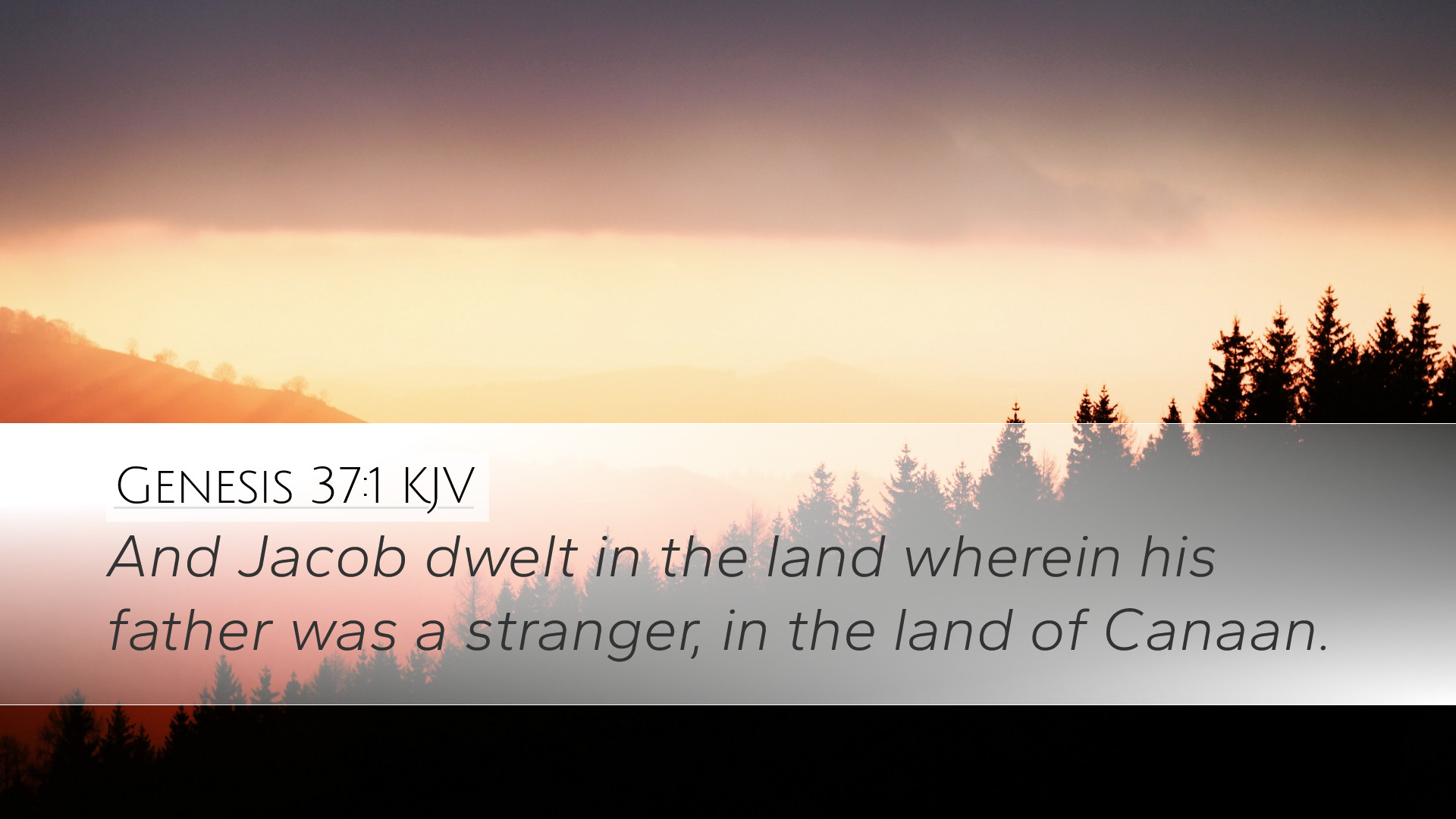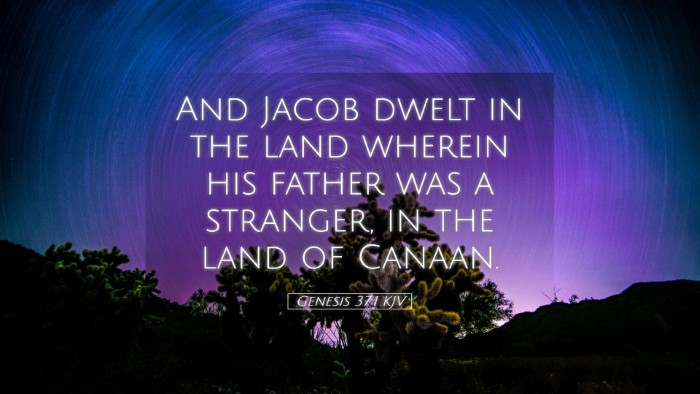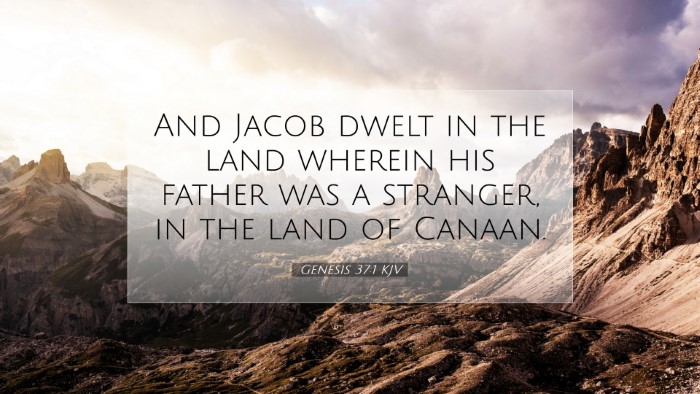Commentary on Genesis 37:1
Genesis 37:1 states: "And Jacob dwelt in the land wherein his father was a stranger, in the land of Canaan." This verse serves as an important introduction to the narrative that follows, establishing the context for the life of Joseph and the unfolding drama within Jacob's family. In this commentary, we will explore the insights from various public domain commentaries, particularly those of Matthew Henry, Albert Barnes, and Adam Clarke.
Historical Context
According to Matthew Henry, the historical backdrop is critical in understanding the significance of this verse. Jacob had returned to Canaan after years of living with Laban. This return symbolized not only a geographical shift but also a return to the divine promise made to Abraham concerning the land. The emphasis on “the land of Canaan” underscores its importance as the promised land.
The Significance of Dwelling
Albert Barnes provides insight into the word "dwelt," emphasizing that Jacob's settlement in Canaan was divinely ordained. Jacob, having been a wanderer for many years, begins a new chapter of his life here, raising his family in the land intended for them. This transition is rich with theological implications, as it reflects God’s faithfulness to His promises.
- Divine Assurance: Jacob’s establishment in Canaan signifies God's affirmative response to his struggles and highlights God's covenant with Abraham and his descendants.
- The Role of Family: Jacob’s family dynamics in Canaan set the stage for the events involving Joseph, revealing the complexities of familial relationships in the face of divine plans.
Jacob’s Identity and His Family
In this verse, Jacob’s identity as "a stranger" is also crucial. Adam Clarke explains that describing Jacob as a stranger emphasizes both his experience as a foreigner and the transient nature of earthly life and possessions. Despite his many blessings, he was still living as a temporary resident in Canaan, which foreshadows the trials his family would soon encounter.
Exploration of Jacob’s Family Dynamics
This verse introduces a family that is rife with tension. According to Matthew Henry, the history that unfolds in subsequent chapters reveals jealousy, betrayal, and the favor that Joseph receives, all of which cause rifts within the family. The context of Jacob staying in Canaan allows readers to engage with these complex interpersonal dynamics, heightening understanding of the struggles the family faces.
Theological Reflections
This particular verse raises significant theological reflections about God’s providence. As noted by Albert Barnes, the mention of Canaan represents the land of promise and divine favor, reinforcing the belief that God is actively involved in human affairs. Jacob's life in Canaan acts as a narrative thread that weaves hope and expectation throughout subsequent events in the book of Genesis.
Imagery of Land and Promise
The land itself serves as more than a mere geographical location; it symbolizes the fulfillment of God’s covenant. The juxtaposition of Jacob as a sojourner highlights the interplay between divine promise and human struggle. The land of Canaan is filled with rich imagery representing not only physical sustenance but also spiritual hope.
- Faith in God’s Promises: Jacob's stay reflects an assurance in God's commitment despite the surrounding challenges.
- Struggles and Trials: Jacob’s new life in Canaan serves as a precursor to the trials that will deepen his faith and the faith of his descendants.
Lessons for Today’s Believers
Genesis 37:1 offers several valuable lessons for today's believers, particularly in the arena of familial and community relationships. The narrative fosters reflection on themes of patience, perseverance, and the unwavering nature of divine promises.
1. Understanding Spiritual Sojourning
Adam Clarke reflects on the reality that believers today may also feel like strangers in a world that often contradicts their faith. The lesson from Jacob’s experience can encourage believers to embrace their identity as pilgrims, trusting in God's promises while navigating life’s complexities.
2. Navigating Family Dynamics
Families today can resonate with Jacob’s story of favoritism and rivalry among siblings. This biblical account calls for Christians to seek reconciliation and unity within their families, reflecting Christ's love and forgiveness.
3. Reliance on Divine Providence
Finally, Jacob’s situation serves as a reminder that God is in control. As seen in Matthew Henry’s discussions, believers are called to maintain faith during periods of uncertainty, ensuring their lives reflect trust in God’s ultimate plans.
Conclusion
In summary, Genesis 37:1 sets the stage for a pivotal narrative in the Bible. Through the perspectives of Matthew Henry, Albert Barnes, and Adam Clarke, we gain a layered understanding of Jacob's significance, familial challenges, and the rich promises associated with the land of Canaan. This verse invites pastors, students, theologians, and Bible scholars to delve deeper into the complexities of human experience and the steadfastness of divine promises, ultimately enriching their study and application of scripture.


